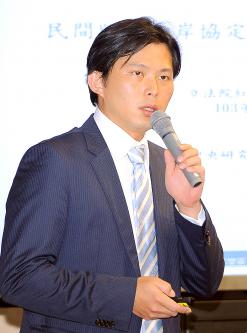An investigation team set up by the legislature’s Judiciary and Organic Laws and Statutes Committee that is scheduled to visit Academia Sinica tomorrow is an “intimidation measure,” said an associate research professor at the institution’s Institutum Iurisprudentiae.
Huang Kuo-chang (黃國昌) — a leading figure in the Sunflower movement — yesterday posted on Facebook two scanned copies of legislative documents that said the committee is scheduled to visit Academia Sinica tomorrow to inspect “the condition of its staffing levels and enhancements in performance after the institution’s restructuring.”
Huang said he suspects his attendance record is the target of the committee’s investigation team, “which, if true, would be a pretty cheap way to evaluate an Academia Sinica researcher.”
“My academic performance is duly assessed by the professional community. I don’t think the committee needs to go to this trouble for a performance review. I hope they are not here to exert inappropriate pressure on the research institution,” he added.
Chinese Nationalist Party (KMT) Legislator Lu Hsueh-chang (呂學樟), who convenes the committee, said that the investigation is into the institution’s overall performance, rather than that of any individual.
“Why is Huang worried about the inspection? Does he have something to hide?” Lu asked.
“This is a public matter. Do not confuse it with private issues. [Huang] is also a civil servant, who still needs to perform his duties on time and undergo assessments of his work,” Lu said.
“Any violations against the Civil Service Act (公務員服務法) would be dealt with,” he added.
Huang is not the only Academia Sinica researcher who supported the student-led Sunflower movement against the government’s handling of the cross-strait service trade pact, or criticized the government over the issue.
Institute of Sociology research fellow Chiu Hei-yuan (瞿海源) led about 200 Academia Sinica researchers and staff in a protest against President Ma Ying-jeou (馬英九) when he attended a conference at the institution last month on sovereignty disputes concerning the Tokyo-controlled Diaoyutai Islands (釣魚台), which Taiwan and China also claim.
Source: Taipei Times - 2014/05/11





















